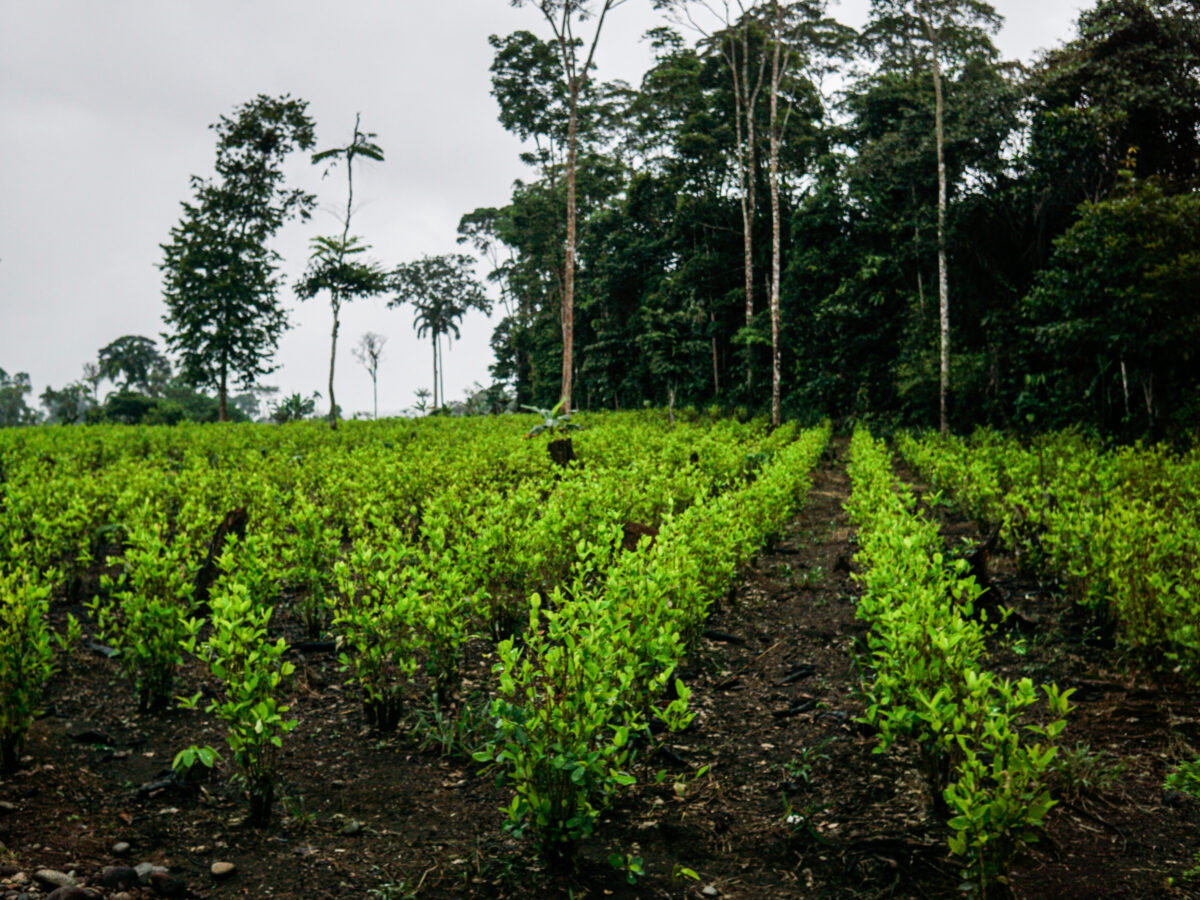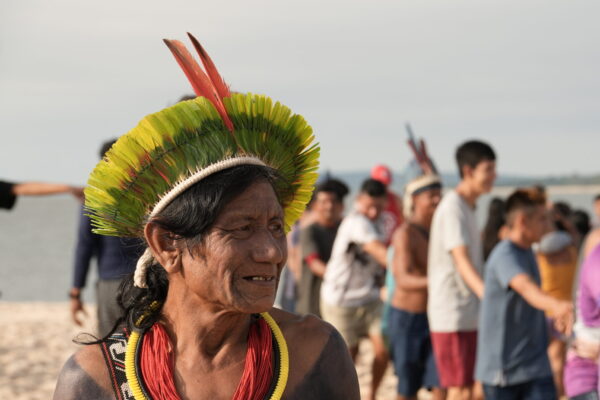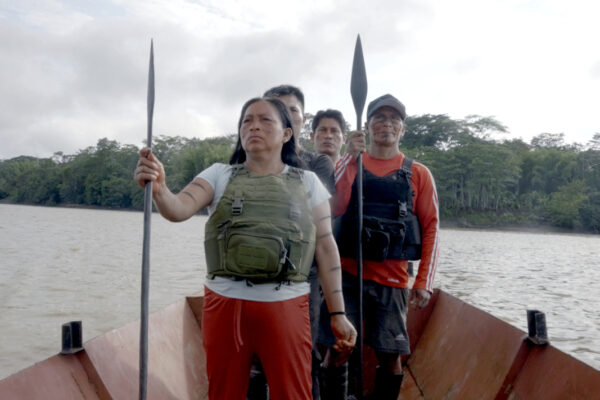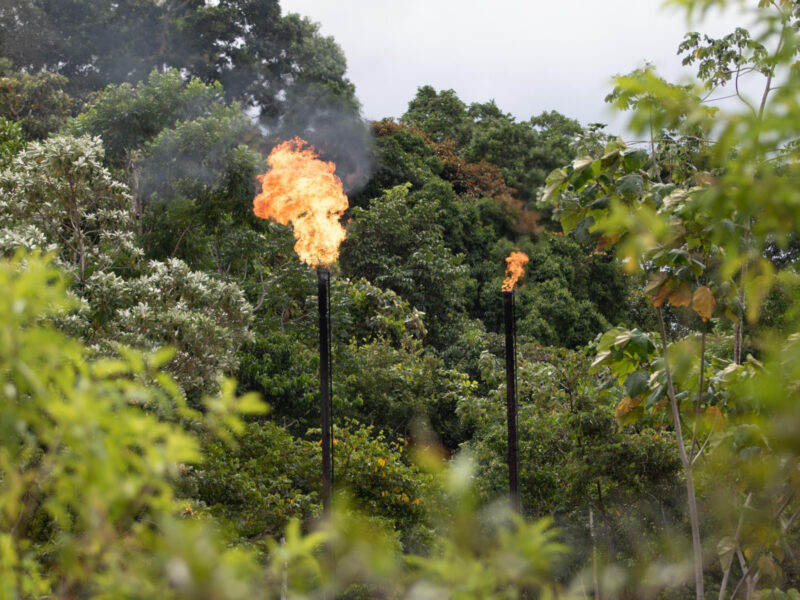Organized crime is not just a threat to public safety. It is now one of the main drivers of Amazon deforestation and Indigenous displacement. In response, Amazon Watch has expanded its mission to support Indigenous partners in confronting these criminal networks.
Our recent report, In the Shadows of the State, released just before the 2025 Presidential Summit of the Amazon Cooperation Treaty Organization (ATCO), revealed how armed groups are taking over entire territories, acting as de facto governments, and fueling environmental destruction. Thanks in part to this pressure, the summit approved a new Indigenous governance mechanism and secured commitments from regional governments to scale up cooperation against organized crime. But this struggle is only just beginning.
Why Amazon Watch is confronting organized crime
Over the last five years, our Indigenous partners have sounded the alarm: illicit economies and transnational criminal networks are now among the greatest threats to their rights and survival.
Drug trafficking, illegal gold mining, logging, and human and wildlife trafficking have led to displacement, contamination, deforestation, and widespread violence. According to our Amazon Underworld research developed with our allies at Amazon Underworld, organized crime groups are present in 70% of Amazonian municipalities, making the region one of the most dangerous places in the world for environmental defenders.
In response, we have scaled up our support for frontline defenders. This includes emergency grants, as we’ve provided to the Kakataibo people of Peru. Their ancestral lands have been invaded for coca production, resulting in displacement and the murder of leaders. Alongside this immediate protection, we are helping secure land titles, advocate for government agencies to support them and implement policies to protect defenders and communities at risk.
Building on these efforts, we launched the Amazon Crime campaign, which calls for public attention, effective government action, and international cooperation. Our research and advocacy stress that illicit economies can only be curbed by strengthening Indigenous territorial governance, supporting alternative livelihoods, and tackling the root causes of violence.
What’s happening in the tri-border region?
Our latest investigation with the award-winning Amazon Underworld journalism network shows that the tri-border region – where Colombia, Ecuador, and Peru meet – is now a hotspot of transnational crime. Groups like the Comandos de la Frontera (CDF), Los Lobos, and Los Choneros in Ecuador have established what we call “criminal governance.” They control river routes, jungle trails, and even influence local politics. They tax goods, extort communities, and dominate illegal economies such as coca cultivation and gold mining.
Their dominance operates through daily, systematic control. Children are recruited or coerced into joining armed groups. Indigenous leaders who resist are threatened, displaced, or murdered. Communities are forced to build infrastructure for drug transport and attend mandatory meetings under threat of violence. In town after town, armed men monitor WhatsApp groups, inspect phones, and control movement.
Meanwhile, rivers are poisoned with mercury from illegal gold mining, wildlife is trafficked, and vast areas of forest are destroyed. Indigenous peoples – long the Amazon’s stewards – are now under siege. Their survival, and that of the forest itself, is at grave risk.
Why is this happening?
The criminal takeover of the tri-border and other areas of the Amazon is fueled by isolation, neglect, and global consumer demand. Weak state presence and decades of underinvestment in schools, healthcare, land tenure, and infrastructure have left communities vulnerable. Meanwhile, international markets for cocaine, gold, timber, and wildlife provide powerful incentives for organized crime. Corruption and poor coordination between Colombia, Ecuador, and Peru allow these groups to cross borders freely and operate with impunity.
Our research team carried out eight trips to the region, conducting over seventy interviews with social leaders, civil society, government officials, experts, and even armed actors. To understand the local complexity, our team entered deep into the areas dominated by this conflict.
The evidence is clear: only structural, coordinated action centered on protecting the Amazon and supporting Indigenous governance can turn the tide. That is why we presented the report during ATCO in Bogotá in order to address it directly to embassies, international organizations, and even the Colombian government’s chief peace negotiator.
What happened at ATCO?
In August 2025, leaders of the eight Amazonian nations gathered at the Presidential Summit of the Amazon Cooperation Treaty Organization (ATCO). While the meeting did not fully address the impacts of oil extraction, it did approve a new Indigenous governance mechanism – an important step toward recognizing Indigenous leadership in conservation.
Illicit economies were at the heart of the discussion. Colombian president Gustavo Petro, who hosted the meeting, declared: “The main enemy of the Amazon, after global warming, is drug trafficking. And we must unite to fight it, because we are getting closer and closer to the tipping point. As I’ve always said: the security of the rainforest is the security of humanity.”
Despite initial doubts, the summit produced meaningful commitments to strengthen regional cooperation against organized crime.
Amazon Watch’s findings were shared widely, helping spur governments to acknowledge these security threats. Concrete steps included cross-border coordination talks, joint security assessments in the tri-border, and the establishment of a regional security center in Manaus. These are early steps, but they mark the first time Amazonian governments are explicitly linking organized crime, environmental destruction, and Indigenous rights. The challenge ahead is ensuring Indigenous voices and rights are fully included in these processes.
To sustain this momentum, governments and the international community must prioritize:
- Stronger transnational cooperation with a holistic security approach that targets networks, not just local populations.
- Support for Indigenous-led protection, including land titling, legal recognition, and funding for sustainable economies.
- Crackdowns on transnational criminal finance tied to gold, coca, timber, and wildlife.
- Accountability for government complicity and corruption that enable organized crime.
- Protection for environmental defenders and communities facing threats, displacement, and forced recruitment.
Why this matters to all of us
The Amazon is not just a regional concern. It is the planet’s largest rainforest, a critical climate regulator, and home to hundreds of cultures and species. If organized crime continues to thrive in its heart, the consequences will be global: climate collapse, violent conflict, and transnational crime spreading far beyond the forest.
Amazon Watch’s focus on organized crime is not a shift away from environmental defense. It is a recognition that the health of the forest and the safety of its people are under attack by the same violent forces. We will continue pressing for stronger policies and international cooperation at spaces like ATCO and the United Nations, while also supporting Indigenous-led responses on the ground.
In the short term, that means demanding urgent protection and advancing land titling for peoples like the Kakataibo of Peru, who are defending their territories against criminal invasion. Their fight is our fight – for the rainforest, for justice, and for the climate we all depend on.














